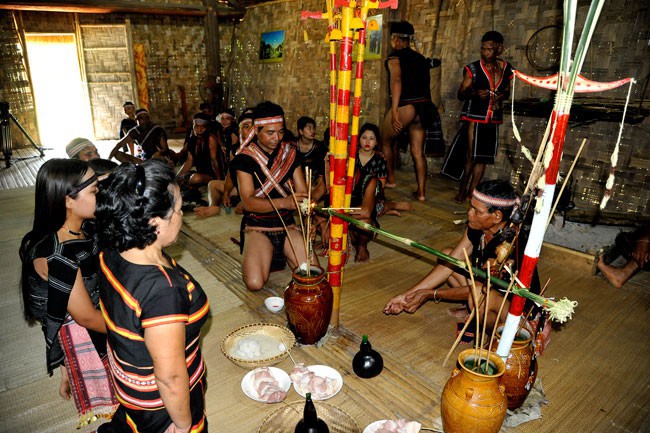The To Mon ceremony gathers family and friends to promise to share the joys and the difficulties of life.
The Ba Na of Vietnam’s Central Highlands celebrate many festivals each year, including a peace worship, a new rice ceremony, and To Mon – a ceremony to strengthen solidarity. The To Mon ceremony gathers family and friends to promise to share the joys and the difficulties of life.

A To Mon ceremony in the traditional Rong house of Central Highlanders. (dangcongsanvn.com)
The Ba Na of Gia Lai province hold a To Mon ceremony attended by all villagers.
“There are two types of twinning ceremony – custom and emotion. A custom twinning ceremony is organized when one person experiences problems in life,” said Dinh Ply, a Ba Na man who lives in Co Bang district.
“A village chief or a shaman connects him with someone who can become his foster parent, brother, or sister and hosts a ceremony to twin them. An emotional twinning is done when two people have a good relationship and want to become twinned brothers or sisters.”
Dinh Ply says that when the Ba Na settle in a new place, they organize a solidarity ceremony with their neighbors, even if they are from a different group.
The Ba Na believe this ceremony connects individuals in a close bond so they can overcome difficulties and celebrate happiness together.
“After a solidarity ceremony, we feel closer to each other. People of two villages will have as good a relationship as a family. We can ask each other for help without hesitation,” said Dinh Ply.
A twinning ceremony usually takes place in the morning, when the air is fresh and clear. People can hear the cheerful sound of gongs, drums, and clarinets from very far away, welcoming them to the twinning ceremony.
“The offering should include chicken and pork. For example, the foster father might contribute a pig and the foster child might bring a chicken and a bottle of wine. The offering for a brother twinning ceremony is similar. The ceremony is held at the house of the foster father or foster brother,” said Dinh Thien, another Ba Na man of Co Bang district.
The village chief or the shaman sits at the center of the ceremony. When he finishes reading prayers to the deities, the two persons are twinned. They drink wine together and serve wine to all the participants, who are relatives, friends, and neighbors.
“Everyone drinks wine, including the shaman. The twinned persons treat each other as brothers by birth. Their relationship will last until they die,” said Dinh On of Co Bang district.
At the twinning ceremony they give each other bracelets, necklaces, blouses, or loin-cloths. The village chief tells them things they should and should not do in their relationship, otherwise the deities will punish them.
“The twinned brothers give each other a bracelet, witnessed by all the villagers. They promise not to abandon each other in any circumstance, until death separated them,” said Dinh Thien. VOV



